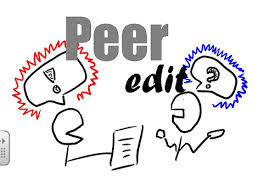Will I offer suggestions publicly (blog) or privately (email, etc.)?
I think I would choose both ways when peer editing someone else's work. I think that it is best to edit someone's work on their blog because they can easily access and see where they may have made mistakes. I wouldn't put them down on the blog or even through email, I would simply offer some suggestions to the author in a way that they could understand and help future readers understand what they are trying to convey. I would mainly just leave compliments on their blog to say what a really good job they did, and tell them what I enjoyed about their work. Like in the video Writing Peer review Top 10 Mistakes, I don't think that it is a good idea to be a "picky patty," or a "mean margaret". It is best if you leave a comment that will help the author understand what they did wrong in a way that you would want someone else to let you know. But I would also write to the author privately, so they didn't feel like I was trying to embarrass them in front of their readers. Again I would compliment on their topic, and leave suggestions for them to think about. Maybe the author made some mistakes that he/she did not catch in their own proofreading. I would then make the suggestions clear and precise on what I think would make their work better, and leave it for them to decide what they want to correct, whie still being positive.
What I learned today from the material
I learned today on how to positively edit another author's work. According to What is Peer Editing?, there are three main steps in writing a great peer edit. I learned that the first step is to always compliment the author of the work. You should always start your peer edit with a compliment. Some examples of those could be: "I really loved your topic.", My favorite part was .... because..."' or "This was really fun to read because...." I also learned that you should be specific about what mistakes you are correcting. Don't be vague about the corrections. You shouldn't be like you did this wrong, or you have several grammatical errors. You should show/tell them what they did wrong so they can go back and fix the mistakes. You should offer up suggestions that will help the author convey what he/she is trying to say in a more clear way. You should comment on their word choice, maybe they had some vague details and need to elaborate on them, or maybe the work was not as organized as it should be. All in all you should offer up advice that is critical but at the same time helpful and harmless so that other readers can understand the work.

It is very important not to hurt the other person's feelings during peer review because insults may cause the other person to forget that they should be getting helped. Good post!
ReplyDeleteSherri - How do you know whether your comments will hurt someone's feelings? If you tell a lineman he missed a tackle and that it is critical that he not do that again, or if you tell a pilot trainee that he just put the flaps down (which you immediately corrected) and that would lead to a crash (in which both of you might be killed, or if you told a student doing his first operation that he left a tool inside the incision, would you hesitate to tell them because their feelings might be hurt or they may feel you are insulting them? What is the difference in what you suggest?
DeleteThoughtful. Thorough.
ReplyDeleteHi, Christopher! This was a very good post, and you write very well! The only thing that needs to be corrected is in the section "What I learned today". The third line down you say, "You should always start you peer edit", and that "you" should be "your". Aside from that, great job!
ReplyDeleteGreat Job! Very thoughtful!
ReplyDelete